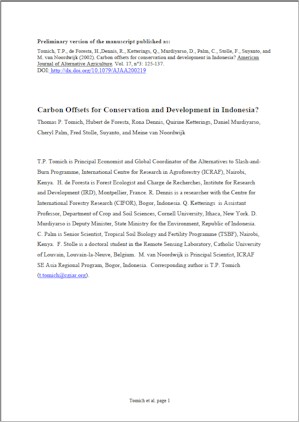| Journal Article |
 |
|
| Article Title | Carbon offsets for conservation and development in Indonesia? | | Author | Thomas P Tomich, Hubert de Foresta, Rona Dennis, Quirine M Ketterings, Daniel Murdiyarso, Cheryl A Palm, Fred Stolle, S. Suyanto and Meine van Noordwijk | | Year | 2002 | | Journal Title | American Journal of Alternative Agriculture | | Institution | CAB-International | | Volume | 17 | | Issue | 3 | | Pages | 125-137 | | Call Number | JA0206-05 | | Keywords | agroforestry, carbon sequestration, Clean Development Mechanism, Kyoto Protocol, policy reform, sustainable development, tropical forests |
|
| Abstract: |
| The logic of the Clean Development Mechanism (CDM) and other such ‘carbon offsets’ rests on the notion that the opportunity cost of reducing carbon emissions is lower in developing countries, creating opportunities for mutually-beneficial carbon trading. While the CDM may offer significant gross financial benefits, there has been little analysis of the opportunity costs of foregone resource exploitation and development opportunities. In addition to assessing the potential for net benefits, this paper also considers the practical implications for design and implementation of carbon offsets for forest conservation and agroforestation in Indonesia. Virtually nothing is known about these administrative factors, and their associated costs, which also can play a decisive role in feasibility of carbon offset schemes. Data are from field studies in the lowlands of the Indonesian island of Sumatra, where forests and derived land uses are broadly representative of the lowland humid tropical rainforest systems of insular Southeast Asia. These data are the basis for assessing the tradeoffs between natural forest protection for carbon sequestration and conversion to other land uses to meet national development objectives that directly affect people’s livelihoods. Carbon stocks are analyzed in terms of ‘time-averaged’ carbon, an indicator developed for this project. Opportunity costs of land use alternatives are estimated using standard techniques for economic assessment of investment projects in developing countries. The study finds that imputed timber values are a significant share of the opportunity costs of forest conservation, even for conservative estimates of timber prices. The question of compensating for these foregone values raises complex questions regarding the political economy of Indonesia since property rights over these resources are highly contentious. These controversies over property rights also are examined within the context of recurrent smoke pollution from land fires in Indonesia, which (among other problems) contribute to greenhouse gas emissions. This smoke is symptomatic of deeper political and institutional problems that raise questions about the permanence of carbon storage through land use practices in Indonesia. In comparison to forest conservation, carbon offsets through agroforestation seem more feasible in Indonesia because property rights over timber from planted trees would be easier to establish and enforce than property rights over timber from natural forests. Although results in this paper look promising, there still is much to be learned about implementation costs even for the ‘easier’ case of agroforestation. |
|
|
Download file(s): Click icon to download/open file.
|
| |
File Size |
Description |

|
279 KB |
Softcopy |
|
|
|
| Viewed in 2125 times. Downloaded in 71 times. |